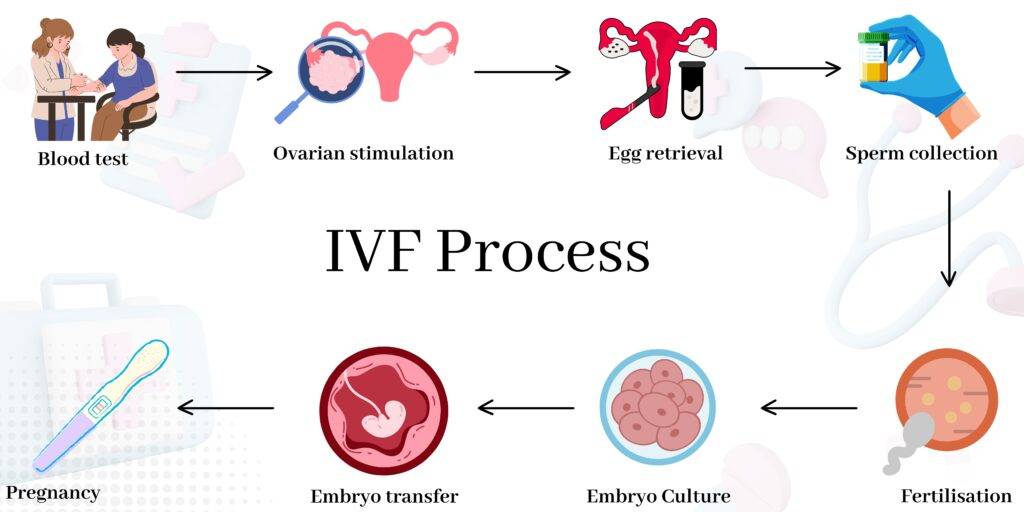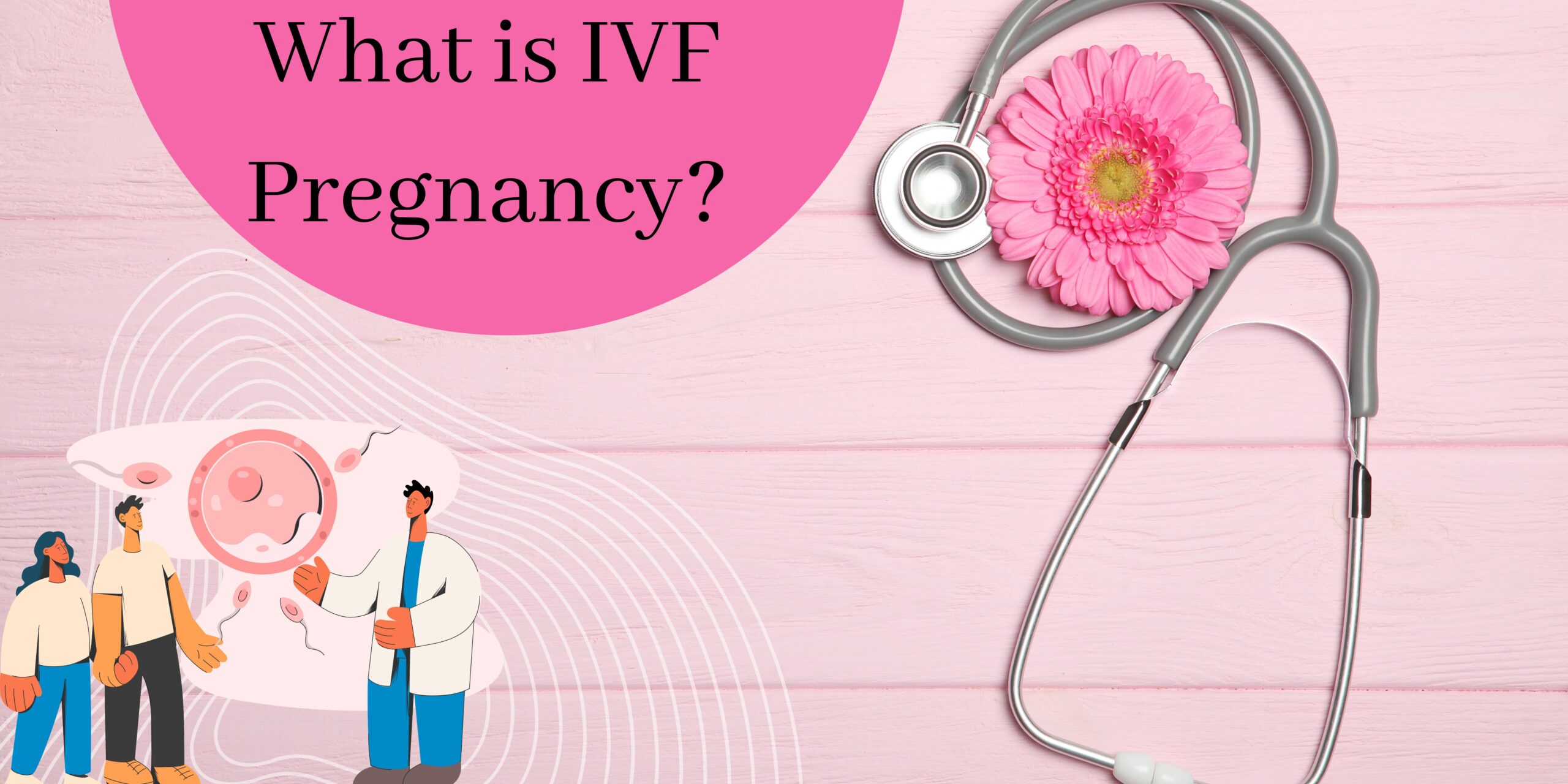Popular Searches
What is IVF pregnancy?
What is IVF Pregnancy?
A type of technology for assisted reproduction called in-vitro fertilisation (IVF), commonly referred to as the “test-tube baby procedure,” involves the union of eggs and sperm outside of the female’s body under ideal laboratory conditions. The fertilised egg, or embryo, is then likely implanted into the female’s uterus and given time to grow naturally.
IVF is a multi-step, intricate procedure that needs constant observation at every stage. When other fertility treatment fail, IVF helps.
Why is IVF done?
Individuals may become infertile for a variety of reasons. These problems, which include the following, are treated with IVF:
- Endometriosis
- Uterine fibroids
- Blockage in fallopian tubes
- Age of the woman
- Low sperm count and poor sperm motility in men
- Problems related to ovulation due to PCOS and PCOD.
- Genetic disorder
- Had any kind of surgery in the past to prevent pregnancy.
What should I do to prepare for IVF Treatment?
- IVF consultation
- A uterine exam, up-to-date Pap test
- A semen analysis
- Screening for sexually transmitted infections (STIs) and other infectious diseases
- Ovarian reserve testing
- Blood and urine tests
- Instructions on how to administer fertility medications
- Genetic carrier screening
- Uterine cavity evaluation
- Start Eating a healthy and well-balanced diet
- Start taking prenatal vitamins
- Maintain a healthy weight
- Stop smoking, drinking alcohol, and any kind of drugs

Steps involved in IVF
As said earlier, IVF is a complex process involving a series of steps which usually takes about four to six weeks. All the steps are performed in one menstrual cycle and constitute one cycle of IVF. These are as follows:
1. Blood test: This is done the first day of your menstrual cycle, prior to the procedure, to measure your level of FSH (follicle-stimulating hormone), which will help a fertility specialist determine the quality and quantity of eggs a woman may be able to produce.
2. Hormone stimulation, also known as superovulation: Following a blood test, medications are administered to increase the production of eggs on days two or three of the menstrual cycle. During this procedure, women are put on continuous ultrasound and blood tests to examine ovaries and to check hormone levels. If not enough eggs are not produced, eggs from donors can be used.
3. Egg retrieval: Once ovaries are mature enough and release eggs, a short procedure called follicular aspiration is performed to retrieve the eggs from the female’s body. Sedatives are given to women at the start of this step, and then a needle is connected to a suction device, and a test tube is inserted into the ovary which collects the egg and fluid out of the follicle. The process is repeated for another ovary as well.
4. The processes of insemination and fertilisation involve the collection of a male sperm sample on the day of the egg retrieval and its subsequent mixing with the eggs. In cases where there is little chance of fertilisation, donor sperms or intracytoplasmic sperm injection (ICSI) may be used.
5. Embryo development: To make sure the embryos are a perfect fit for implantation, they will be closely watched for five to six days following egg retrieval. Pre-implantation genetic diagnosis, or PGD, is recommended for couples who carry a genetic disorder and run the risk of passing it on to their offspring. This procedure helps identify which embryos are suitable for implantation and lowers the likelihood that a genetic disorder will be passed on to the child.
6. Embryo transfer: The embryo is implanted into the woman’s uterus following fertilisation and development. A thin tube containing embryos is inserted into the vagina of a woman via the cervix. The embryo grows by adhering to the uterine lining. In rare circumstances, multiple embryos may be implanted, producing twins or triplets.
7. Pregnancy test: A pregnancy test is conducted approximately two weeks following the transfer of the embryo.
Symptoms following IVF treatment to be anticipated:
- Light spotting
- Abdominal cramps
- Bloating
- Nausea
- Increased breast tenderness
- Frequent urination
- Mood swings
- Sense of smell is heightened
- Headaches
- bruising from injections
- allergic reaction to medicines
What alternative therapies are available before undergoing IVF?
Before choosing IVF, you can attempt the following alternative fertility treatments:
- Medications
- Surgical techniques
- IUI
Medications
Numerous fertility medications are available, such as tamoxifen, metformin for PCOS-affected women, gonadotrophin-releasing hormones to induce ovulation, and dopamine agonists for ovulation.
Procedures in Surgery
Fallopian tube surgery is one type of surgery used to open up your fallopian tubes and allow eggs to pass through more easily.
Laparoscopic surgery to treat PCOS and endometriosis, as well as to remove uterine fibroids.
Intrauterine insemination, or IUI
Most people, before going for IVF, try IUI’s method of conception. Intra-uterine insemination, also known as artificial insemination, is a process in which semen is collected and washed, and the best sperm are chosen for the procedure.
Then, through the cervix, sperm are transferred into the female’s womb using a thin plastic tube.
Compared to IVF, this process is simpler, more natural, and less costly.
How many IVF treatments are successful?
The age of the woman having IVF, the age of her partner, and the reason for her infertility are just a few of the variables that affect the success rate of this treatment.
Compared to women over 40, who have an achievement rate of only 7-8%, women under 35 have a success rate that is greater or roughly 60%.
Note that IVF will not be always successful in one cycle, some woman needs to go for 2-3 cycles or even more. However it is advised by doctors to go for not more than 6 cycles of IVF.
Risks and benefits associated with IVF pregnancy
Risks associated with IVF Pregnancy
- Low birth weight in babies
- Premature delivery of babies
- Ectopic pregnancy in a woman
- Failed embryo implantation
- Ovarian hyperstimulation syndrome which is rare
- Can experience side effects like nausea, bloating, etc.
Benefits associated with IVF pregnancy
- High Success Rate
- control of time is in your hand
- Increased Chance of Having a Healthy Baby
- Fertility preservation
- Less chances of miscarriage
- It is usable by anyone
- Increased chances of becoming pregnant


